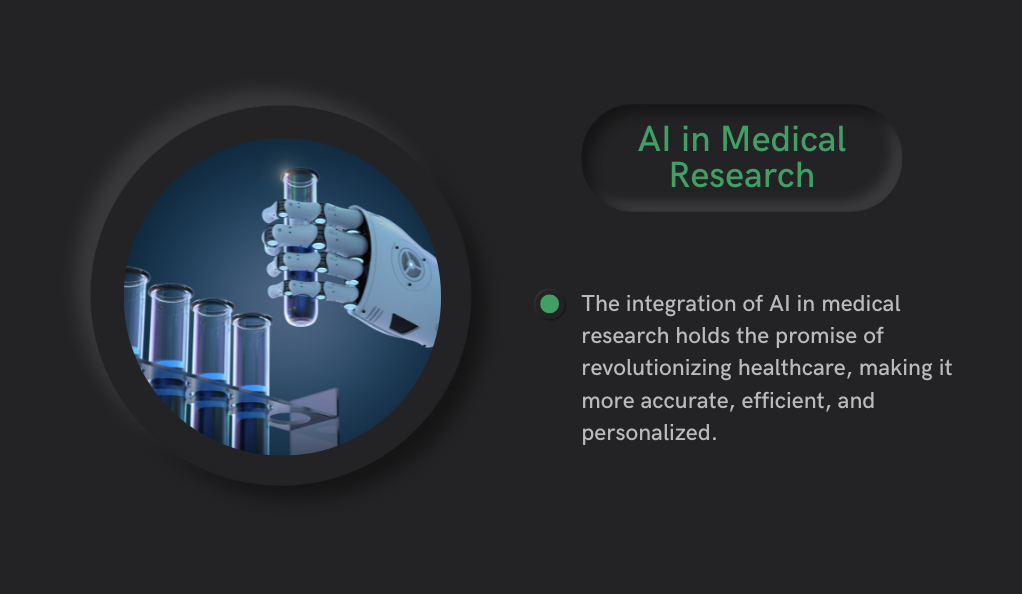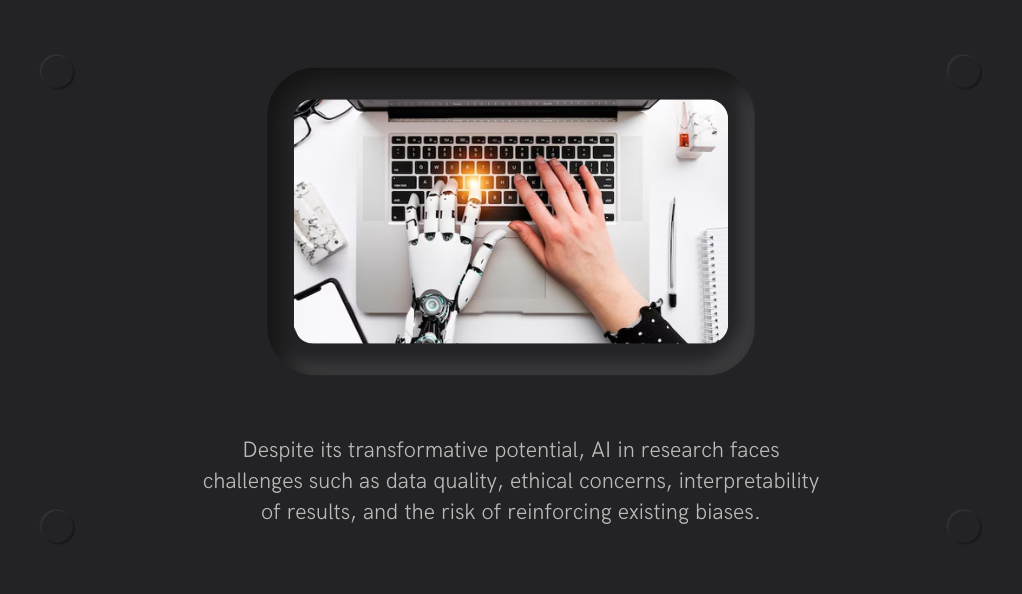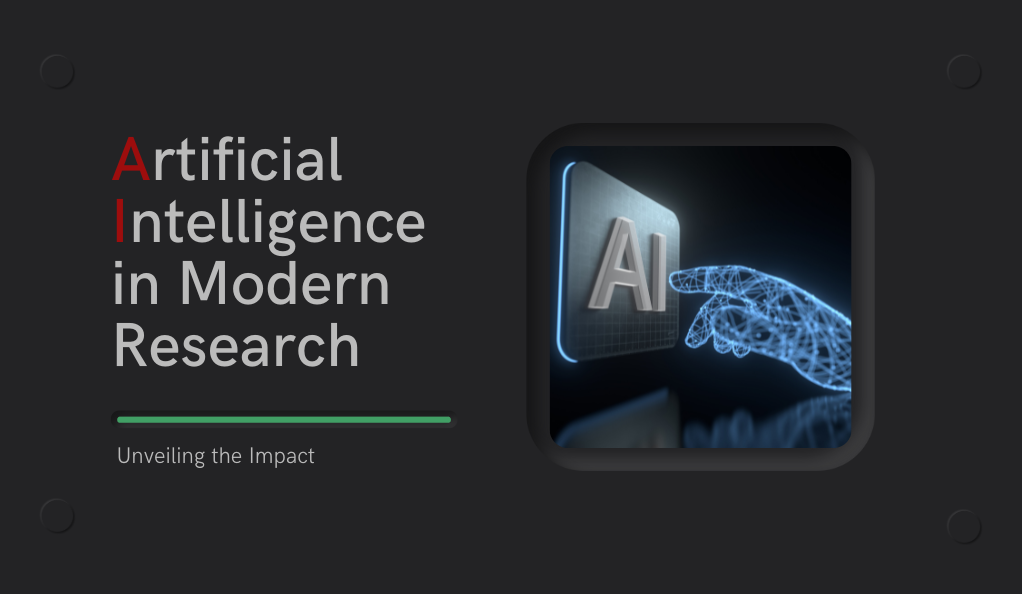In the ever-evolving landscape of technology, Artificial Intelligence (AI) has emerged as a pivotal force, driving innovation and efficiency across numerous domains. From its inception as a theoretical concept to its current state of practical applications, AI has undergone a remarkable transformation, becoming an indispensable tool in modern research.
The genesis of AI can be traced back to the mid-20th century, with the advent of computers and the subsequent development of algorithms capable of simulating human intelligence. Over the decades, advancements in machine learning, neural networks, and natural language processing have propelled AI to new heights, enabling machines to learn from data, make decisions, and perform tasks that were once the exclusive domain of humans.
Today, AI’s influence permeates various fields of research, acting as a catalyst for discovery and innovation. In medicine, AI algorithms analyze complex biomedical data, aiding in the development of novel therapies and personalized treatment plans. In finance, AI-powered tools assess market trends and risks, providing invaluable insights for investment and trading strategies. From environmental science to social sciences, AI’s versatility and computational prowess have opened new avenues for exploration and problem-solving.
The integration of AI in research has not only accelerated the pace of discovery but also enhanced the precision and reliability of findings. By automating tedious and time-consuming tasks, AI allows researchers to focus on the more nuanced aspects of their work, fostering a collaborative synergy between human intuition and machine intelligence.
As we stand on the cusp of a new era in research and innovation, the role of Artificial Intelligence is more crucial than ever. It serves as a testament to human ingenuity and the endless possibilities that arise when technology and curiosity converge. In the following sections, we will delve deeper into the specific applications of AI in various research fields, unraveling the layers of its transformative impact.
AI in Medical Research

Artificial Intelligence is revolutionizing the field of medicine, bringing about a paradigm shift in how research is conducted and patient care is administered. The application of AI in drug discovery and development has significantly reduced the time and resources required, leading to faster introduction of life-saving medications to the market. Machine learning algorithms analyze vast datasets of biomedical information, identifying potential drug candidates and predicting their efficacy and safety profiles.
Predictive analytics, powered by AI, plays a crucial role in patient care, enabling personalized medicine. By analyzing patient data, including genetic information, medical history, and lifestyle factors, AI systems can identify risk factors and recommend preventive measures. In cases of chronic diseases, such as diabetes or heart disease, AI tools help in monitoring patient health and predicting potential complications, ensuring timely intervention.
Breakthroughs in medical imaging are another testament to AI’s transformative impact. Deep learning algorithms enhance the accuracy of image analysis, aiding in the early detection of diseases such as cancer and Alzheimer’s. The precision and speed of AI-driven analysis not only improve diagnostic accuracy but also contribute to more effective treatment planning.
AI in Financial Research
The financial sector has embraced Artificial Intelligence, leveraging its capabilities to enhance risk management, fraud detection, and trading strategies. In risk assessment, AI algorithms analyze market trends, economic indicators, and company performance, providing a comprehensive evaluation of potential risks and returns. This data-driven approach facilitates informed decision-making, contributing to the stability and efficiency of financial markets.
Fraud detection has been significantly bolstered by AI, with machine learning models identifying patterns and anomalies that may indicate fraudulent activity. These systems operate in real-time, ensuring immediate response and minimizing financial losses. In the realm of algorithmic trading, AI-powered systems execute trades at optimal prices, maximizing returns and minimizing risks.
Predictive analytics in finance extends beyond trading, offering insights into customer behavior and market trends. Banks and financial institutions utilize AI tools for credit scoring, evaluating a customer’s creditworthiness with greater accuracy and speed than traditional methods. This innovation not only streamlines the lending process but also expands access to credit, fostering financial inclusion.
AI in Environmental Research
Artificial Intelligence is a valuable ally in the fight against climate change and environmental degradation. Climate modeling, powered by AI, provides more accurate and detailed predictions, aiding in the formulation of effective mitigation strategies. Pollution control benefits from machine learning algorithms that monitor air and water quality, identifying sources of pollution and predicting potential impacts on human health and ecosystems.
Wildlife conservation efforts are bolstered by AI, with algorithms analyzing data from satellite images, sensors, and drones to track animal movements and assess habitat conditions. This information is crucial for implementing conservation strategies and combating poaching. In agriculture, AI-driven precision farming techniques optimize resource use, enhancing crop yield while minimizing environmental impact.
The versatility of AI in environmental research underscores its potential to contribute to sustainable development and conservation efforts. By providing actionable insights and automating data analysis, AI empowers researchers and policymakers to make informed decisions, paving the way for a more sustainable future.
AI in Social Sciences and Humanities
The infusion of Artificial Intelligence into social sciences and humanities has opened up new dimensions of analysis and understanding. In fields that traditionally rely on qualitative data, AI’s ability to process and analyze large volumes of text and multimedia content has been a game changer. Researchers now employ machine learning algorithms for pattern recognition, sentiment analysis, and trend prediction, uncovering insights that were previously inaccessible.
In sociology and psychology, AI tools assist in analyzing social patterns and human behavior, providing a more nuanced understanding of societal trends and individual motivations. In history and archaeology, AI-powered image and pattern recognition tools help in the restoration and analysis of ancient artifacts, bringing the past to life with unprecedented detail.
However, the integration of AI in social sciences and humanities also raises important ethical considerations. The potential for bias in AI algorithms, particularly when dealing with sensitive social issues, necessitates a careful and critical approach. Researchers and practitioners must remain vigilant, ensuring that the tools they use are transparent, unbiased, and respectful of privacy and diversity.
Challenges and Limitations of AI in Research

While Artificial Intelligence has undoubtedly transformed the research landscape, it is not without its challenges and limitations. One of the primary concerns is the issue of data privacy and security. The vast amounts of data required to train and operate AI systems raise questions about the ethical collection, storage, and use of information, particularly when it comes to sensitive personal data.
The need for large, high-quality datasets is another challenge, as the accuracy and reliability of AI systems are directly tied to the quality of the data they are trained on. Incomplete or biased datasets can lead to skewed results, undermining the validity of the research.
Furthermore, the ‘black box’ nature of many AI algorithms poses a challenge to transparency and interpretability. Understanding how an AI system arrives at a particular conclusion is crucial, especially in fields like medicine and finance, where decisions have significant real-world implications. Efforts are underway to develop more interpretable AI models, but this remains an ongoing area of research and development.
The Future of AI in Research
Looking ahead, the potential of Artificial Intelligence in research is boundless. As technology continues to advance, we can expect to see even more innovative applications of AI across various fields. The integration of AI in interdisciplinary research holds particular promise, fostering collaboration and innovation at the intersection of different fields.
The development of ethical AI is paramount, ensuring that the benefits of AI are equitably distributed and do not come at the expense of privacy, security, or fairness. Researchers, ethicists, and policymakers must work together to establish robust guidelines and standards, guiding the responsible development and deployment of AI in research.
As we navigate this exciting frontier, the role of Artificial Intelligence in accelerating research and unlocking new possibilities is undeniable. With its ability to analyze complex data, identify patterns, and generate insights, AI is a powerful tool that has only just begun to reveal its full potential.
Conclusion
Artificial Intelligence has emerged as a transformative force in modern research, accelerating discovery and innovation across a multitude of fields. From medicine and finance to environmental science and the social sciences, AI’s impact is profound and far-reaching.
This article has explored the various ways in which AI is revolutionizing research, highlighting both its transformative potential and the challenges that accompany its integration. As we continue to unlock the capabilities of AI, it is clear that its role in research will only grow, shaping the future of discovery and innovation for years to come.




